Israeli President Reuven Rivlin told the European Union that the recent French initiative to restart negotiations between Israel and the Palestinians distances prospects of peace, and suggested a number of alternative avenues where the involvement of the international community could be constructive.
“The French initiative suffers from fundamental faults. The attempt to return to negotiations for negotiations’ sake, not only does not bring us near the long-awaited solution, but rather drags us further away from it,” Rivlin said in a speech to the European Parliament on Wednesday. He encouraged the EU to help promote a peaceful solution between Israel and the Palestinians by focusing on four key areas instead.
First, harnessing the moderate powers in the region. The cooperation with Jordan and Egypt is a supreme common interest of Israel and the international community as well in order to eradicate extremism and preserve the stability of the region. Second, developing Palestinian economy and infrastructures for quality of life. One cannot speak about a future agreement when people live with a basic existential feeling of having no future, no opportunities, no hope, and no horizon.
In order to create opportunities for Palestinians, Rivlin indicated that the international community could partner with Israel to aid residents of Gaza who “are held hostage by a Jihadist terrorist organization, Hamas,” achieve economic independence.
The president also called on the international community to promote joint Israeli-Palestinian development ventures, ranging from the field of renewable energy to tourism.
His fourth suggestion centered on education, which Rivlin said is necessary to confront deep-seated hatred and fear. “Creating the conditions for any future agreement requires conditioning hearts on both sides for the possibility of living with mutual respect,” he noted.
“If Europe is interested in serving as a constructive factor in striving for a future agreement, it will be incumbent upon you its leaders, to focus efforts at this time in a patient and methodic building of trust. Not through divestments, but through investment; not by boycotts, but by cooperation,” he added.
While Rivlin expressed his appreciation to European nations that want to see Israel live peacefully, he said their behavior towards the state did not always seem even-handed.
Just like you, Israel faces difficult and complex challenges. But, unlike Europe which embarked upon a process of removing partitions between nations and states, Israel wishes, and indeed must, remain first and foremost a national homeland, a safe haven for the Jewish People. …
I feel that the massive criticism aimed at Israel in Europe stems from, inter alia, a misunderstanding and an impatience toward this existential need of the Jewish Nation and the State of Israel. On the other hand, and much to my regret, Israel has a growing sense of impatience (when it comes to Europe). There are those who feel anger and frustration toward certain European actions, vis-à-vis what they perceive as sometimes unfair criticism, sometimes even contaminated by elements of condescension, and some would even say double standard.
Rivlin observed that efforts to reach a stable and viable Israeli-Palestinian agreement currently face several obstacles, including a lack of effective Palestinian leadership. There are at least two governing organizations among the Palestinians and one of them, Hamas, “is ideologically committed – in both its political and military leadership – to the annihilation of Israel,” he noted. There is also a lack of “a reasonable regional and economic infrastructure,” Rivlin added. Instead, Israel experiences a “reality where the plague of murderous Jihadi fundamentalism, religious fanaticism and incitement – embodied in the Islamic State and Hezbollah – are at our very borders and have not missed out Gaza and the West Bank either; we live in a reality of a chaos-stricken Middle East in which uncertainty is the only certainty.”
“I believe in the capability of both these peoples to live with each other, for the simple reason that we have no other choice,” Rivlin concluded. “If we desire life, we must, today, invest our utmost efforts in what can be achieved, not in that which cannot – for the sake of our future, and that of our children.”
[Photo: President of Israel ]




